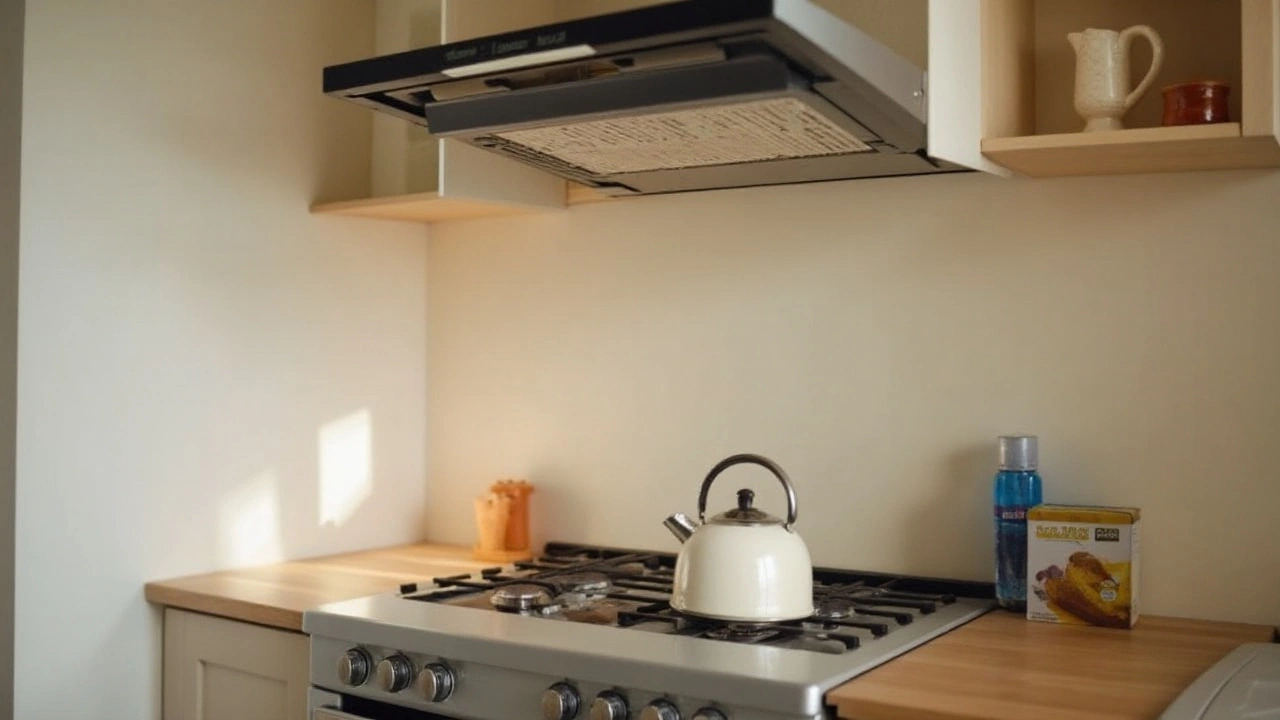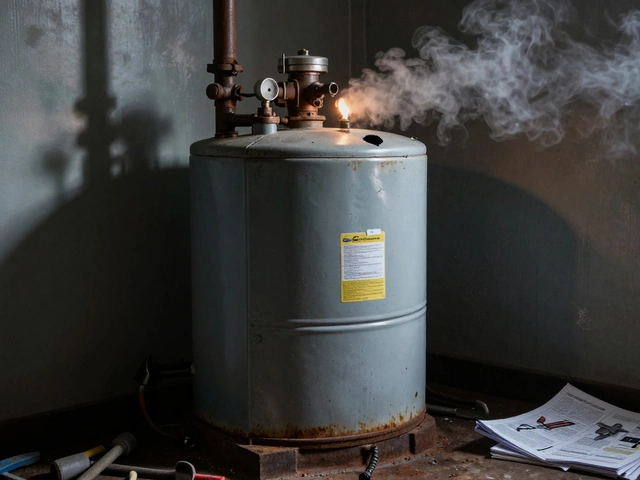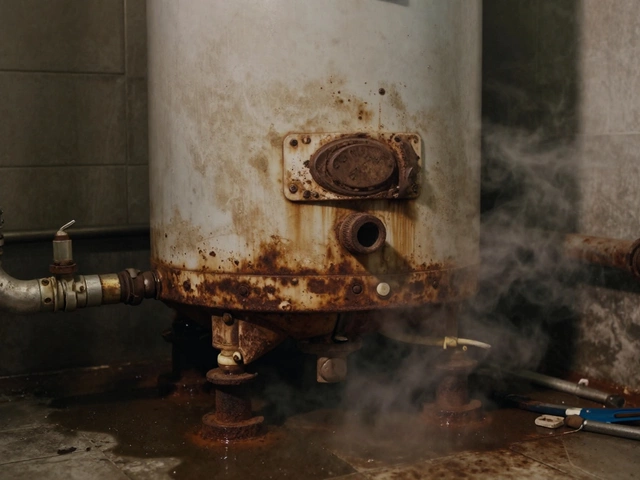Extractor fans are the unsung heroes in our kitchens and bathrooms, tirelessly whisking away moisture, smoke, and smells. So, when your trusty fan suddenly stops working, it can be a headache. But before you rush to replace it, let's see if there's a simpler solution.
There's a variety of reasons your extractor fan might have ceased to function, ranging from electrical issues to mechanical failures. Understanding the different parts of your fan can help you pinpoint the problem and potentially save you a costly repair bill.
In this article, we’ll break down the common reasons for fan failure, guide you on troubleshooting, and let you know when it’s time to seek professional help. Stick around, and you might just find it's a problem you can handle on your own!
- Understanding Fan Components
- Common Causes of Malfunction
- Basic Troubleshooting Tips
- When to Call a Professional
Understanding Fan Components
Extractor fans, although often unnoticed, are complex devices composed of various components, each playing a vital role in ensuring seamless performance. First up is the motor, the heart of the fan. It converts electrical energy into mechanical energy, turning the blades that move air out of your space. A common pitfall with extractor fans is motor burnout, often due to overuse or inadequate maintenance. Regular inspection of the motor can significantly extend the life of your extractor fan and prevent untimely failures.
Next, consider the blades themselves. Made from durable materials like plastic or metal, they need to remain clean and unobstructed to operate efficiently. If your fan isn’t removing air as effectively as it should, a buildup of grease or dust on the blades might be to blame. Cleaning these blades regularly can make a noticeable difference in performance, ensuring the air in your kitchen stays fresh.
The ductwork is another crucial component. It’s responsible for channeling the air from the fan to the exterior. Any blockages or damage here can drastically reduce your fan's efficiency. A properly sealed and undamaged duct ensures that air is being effectively expelled, maintaining proper airflow. Inspections of these ducts can often uncover nesting birds or debris that might have found a home and choked the air path.
According to an HVAC specialist's advice, "Regular maintenance not only prolongs the life of your extractor fan but also improves its efficiency, reducing the risk of costly repairs down the line."
Then, there’s the cover or grill, which often gets neglected. These are the most visible parts of the fan and are usually designed to be easily removable for cleaning. Regularly removing and cleaning the grill prevents dust and other particles from obstructing the airflow. This is especially important in high-use areas like kitchens, where greasy residues can quickly build up.
Lastly, let’s not forget the importance of the electrical system. The wiring and controls form the fan’s nerve center, determining everything from speed to power. Faulty wiring, often indicated by a burning smell or irregular fan speeds, can result from poor installation or wear over time. Ensuring the electrical connections are secure and in good condition can prevent many common extractor fan repair issues.
Taking the time to understand these components will empower you to address minor issues independently, saving time and money on professional repair services. By appreciating how each part contributes to the system's success, you can keep your home’s air circulation at peak performance, make proactive maintenance a part of your routine, and perhaps even preempt the need for extensive repairs.

Common Causes of Malfunction
When an extractor fan stops working, it’s easy to jump to conclusions, but often the solution is less complicated than it seems. A prominent reason for fan failure is a buildup of dust and grease. Over time, these materials can impair the fan's efficiency, leading to a complete stop in operation. Regular cleaning is critical, as ignoring the accumulated debris can cause overheating or even burn out the motor. It's amazing how something as simple as dust, which we deal with every day, can cause such a drastic issue in kitchen ventilation systems.
Another frequent issue is electrical problems. Fans, like all electrical appliances, depend on a stable supply of electricity. A loose wire or blown fuse can disrupt this, leaving your fan powerless. You might not suspect something so simple, but often, checking your breaker box or the fan's fuse itself can reveal the problem.
"When our homes are filled with odors or steam, extractor fans are expected to function tirelessly without a hitch," notes John Burke, a seasoned electrical engineer. "But many don’t realize the importance of regular checks and balances the underlying systems require."
Let's not overlook the obstruction of vents as an issue. Whether it’s a wayward rodent creating a nest or foreign objects that find their way in, blocked vents can cause obstructive pressure, which, in turn, halts fan operation. Modern designs include protective grilles to minimize such risks, yet the chance of obstruction isn’t entirely eradicated. Ensuring there's no obstruction externally and internally can be a lifesaver.
The age and wear of a fan are inevitable causes that shouldn’t be ignored. Like many household appliances, time can take its toll on their mechanical efficiency. Bearings may seize, motors may falter, and structural elements can give way. While this may seem daunting, it often comes down to a part replacement rather than a whole system overhaul. Cleaning and oiling moving parts can extend a facility's longevity, keeping your fan effective long past its expected expiry.
In some cases, poor installation could be the unseen villain in this scenario. An incorrectly installed fan could face continuous strain, eventually leading to deterioration or immediate malfunction. Ensuring the fan’s components are aligned, secure, and correct for its positioning can reduce early malfunctions and extend its operational life. Trust in certifications and checks by licensed professionals when opting for installations, sparing future frustrations.
To put things into perspective, here’s a small snapshot of issues many homeowners face with their fans:
| Issue | Percentage of Occurrence |
|---|---|
| Dust and Grease Build-Up | 35% |
| Electrical Issues | 25% |
| Blocked Vents | 15% |
| Old Age/Wear | 20% |
| Installation Errors | 5% |
By staying ahead of these common causes, your extractor fan will continue to serve its purpose effectively, keeping your home environment comfortable and healthy.

Basic Troubleshooting Tips
Before you throw in the towel on your non-functioning extractor fan, there are a number of steps you can take to diagnose and possibly resolve the issue yourself. Extractor fans, much like any other household appliances, require regular maintenance to function at their best. A clogged filter or a blocked airway might be the simplest fix. Begin by unplugging the fan for safety. A visual inspection for buildups of dust, grease, or debris is often the first step that reveals a lot about what might be wrong. This buildup can restrict airflow, reducing your fan's efficiency, or in some cases, halting its operation altogether.
After ensuring the extractor fan is unplugged, another smart move is to inspect the power source. Sometimes, it's not the fan itself but the electrical supply. Check the circuit breaker or fuse box to make sure there hasn't been a trip or a blown fuse. This is particularly common in older homes where electrical wiring might not be up to modern standards. If your breaker or fuse seems fine, take a moment to inspect the wiring connections directly behind the fan itself. Loose wires could lead to a complete power cutoff or sporadic operation. Once you've checked the power, turn your attention to the fan's switch. Has it worn out or become damaged over time? Replacing a switch is generally easy and inexpensive.
Should your fan still remain stubbornly silent, consider the motor next. A burnt-out motor is not an uncommon occurrence, particularly in overworked or old units. You may be able to tell if the motor is an issue by a distinct burnt smell or by listening for unusual noises like grinding or squealing when the fan is trying to operate. Replacing the motor is a more involved task that might require professional assistance unless you're exceptionally handy. Keep in mind the make and model of your fan as you look for replacement parts, since not all motors are universally compatible.
Still hesitant on whether you're missing something crucial? There's always wisdom in seeking advice from the pros. "A proper diagnostic by a professional can save time and potentially prevent further damage," notes Jane Smith, an HVAC expert with over 15 years of experience. Taking the time for an expert evaluation might cost slightly more upfront but could offer peace of mind and save on unnecessary replacements. However, if you're determined to resolve the issue without professional help, consider investing in a home repair guide specific to extractor fan repair which can offer more in-depth guidance.
In some cases, the answer may lie in replacing the fan altogether. If age and constant use have taken their toll, modern kitchen ventilation systems offer enhanced efficiency and quieter operation. Interface with modern technology often allows these systems to self-diagnose and alert you to potential issues before they become major problems. Keeping your home ventilated and pollutant-free doesn’t have to be a hassle, especially with advancements in fan technology constantly improving the air quality management in our living spaces.

When to Call a Professional
Sometimes, despite your best efforts, your extractor fan repair might require the expertise of a professional. Recognizing when you're in over your head is as important as knowing a common issue. If your attempts at troubleshooting show no results, or if you encounter something that seems out of your league, it's time to seek help. Licensed electricians and HVAC technicians are trained to handle situations that require specialized tools and knowledge. They can diagnose problems quickly, saving you time and preventing potential hazards.
One of the key indicators that it's time to call a professional is persistent electrical problems. If your fan frequently blows fuses or trips the circuit breaker, there could be an underlying electrical issue that requires expert attention. Fire risks associated with electrical faults are not to be taken lightly. Another red flag is unusual noises from the fan, like grinding or squealing sounds which may suggest motor problems or issues with the fan blades.
"A noisy fan often indicates a misalignment or issue with the motor, which can severely compromise its efficiency," says James Robertson, a renowned HVAC technician with over 20 years of experience in the industry.
Moreover, if you suspect there's a blockage that isn't visible or accessible, a professional may need to disassemble parts of the fan to reach the problem area without causing further damage. Experienced technicians can also verify and handle any ventilation issues that might not just require fan servicing but could also relate to the broader ductwork and airflow systems in your home.
In instances where your kitchen's ventilation system is more complex or you've recently installed a new range hood and need integrated systems advice, consulting with a professional can ensure everything is set up correctly to maximize efficiency and safety. Remember, regular maintenance by a professional can also help in identifying issues before they become major problems, ensuring longevity for your fan and keeping the air quality in your home at its best.
It's always good to weigh the cost of hiring a professional against potential risks and benefits. A skilled technician offers peace of mind, knowing that the job will be done safely and accurately—a wise investment in avoiding recurring issues that might arise from a DIY attempt. Don't hesitate to contact a specialist if you're unsure; the safety and comfort of your home are paramount.





